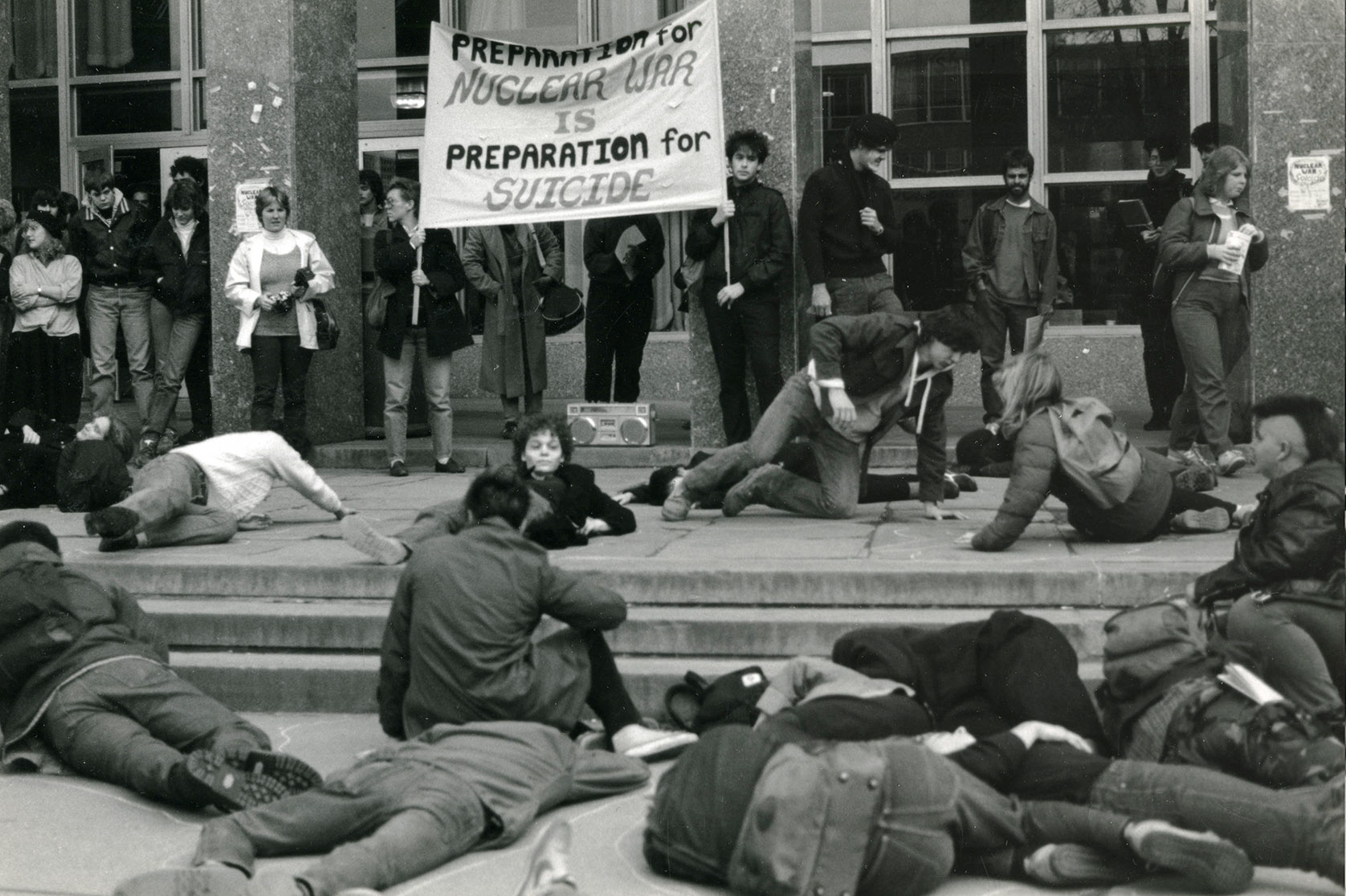Background

Die in on the steps of the Student Union
During the academic year 1986-1987, three students from the University of Massachusetts Amherst conducted a year-long photographic documentation of political demonstrations and protests. Charles F. Carroll, Byrne Guarnotta, and Libby Hubbard captured images of marches ranging from a Take Back the Night march to rallies for gay rights and protests against racism, American support for the apartheid regime in South Africa, and nuclear weapons.
The most volatile point of protest during that year, however, centered on US policy in Central America, and particularly the CIA support of death squads and Contra rebels in Nicaragua. The arrival of a CIA recruiter on campus in November proved to be a flash point, drawing in other activists from throughout the region and, as tensions rose, mobilizing students on both the left and right.
On November 13, the Radical Student Union (RSU) organized a protest at the University Career Center where the CIA had planned to hold a "pre-interview information session." Although the RSU succeeded in forcing the recruiters to cancel the session, they learned the next morning that the interviews had actually been shifted to an undisclosed location elsewhere on campus. In response, a number of protesters marched on the office of Chancellor Joseph Duffey in the Whitmore Administration Building to complain of the University's complicity in dealing with the CIA. Finding the main entrance to Whitmore locked down, they tried several other entrances, eventually gaining admittance to the Affirmative Action office through an unlocked side door. Their efforts to reach the Chancellor were unavailing, and when University police were called in, eleven were placed under arrest for trespass.
The occupation of Whitmore, however, was only the beginning of troubles. Five days later, a group of students presented a set of demands to the administration, asking (among other things) that the University bar CIA recruiters from campus. As tensions mounted, long-time activist Abbie Hoffman phoned members of the RSU, offering to come to campus to hold a workshop and take part in the demonstrations. Amy Carter, daughter of President Jimmy Carter and then a sophomore at Brown University, also came. When the protesters received what they regarded as a tepid and inadequate response to their demands, a crowd of approximately 700 protesters gathered, including Hoffman and Carter, and rallied in front of the Student Union Building before marching on Whitmore. Confronted by a police barricade, approximately 150 members of the crowd broke off and entered adjacent Munson Hall, occupying it for several hours. By the evening, state police in riot gear were called in, and wielding batons and dogs, they began removing the protesters one by one. As the crowd outside chanted "The whole world is watching," 51 were taken under arrest, thirteen of whom -- including Hoffman (who was inside Munson) and Carter (who was outside) -- were singled out and charged with trespassing and disorderly conduct. Throughout, smaller groups right wing counter-protesters squared off against the much larger anti-CIA crowd, complaining that denying access to the recruiters was unpatriotic and an infringement on their rights.
In April 1987, the defendants were tried in the Hampshire County Court House in Northampton. The defense team, led by Leonard Weinglass, raised a "necessity defense" based on provisions in Commonwealth law that exonerate those charged with crimes if they reasonably believed that their actions would prevent the "clear and immediate threat" of greater harm. Judge Richard F. Connon allowed the defense and admitted the testimony of a number of prominent left-wing political figures who provided testimony on the CIA's support for death squads, assassinations, and other illegal activities. The defense succeeded. Although it is unclear whether necessity held greater sway among jurors than the belief that disorderly conduct did not apply, the jury's exoneration of the defendants was widely understood as a rebuke to the CIA and to University policy.





























